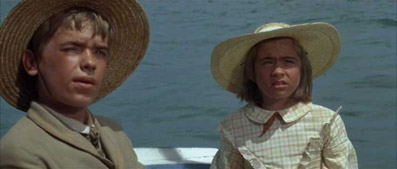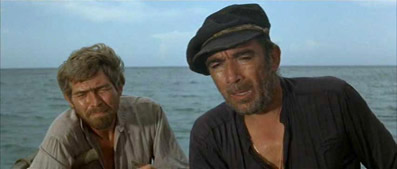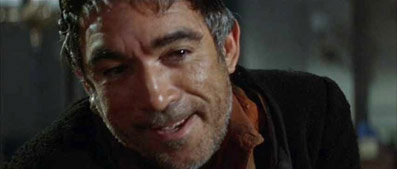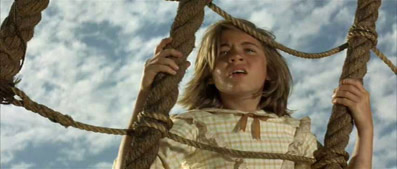| |
Children, in Mackendrick's work, can be dangerous and nasty creatures that prove more harmful than their youth could even account for. Moreover, the film had an atmosphere that bordered on the bizarre and morbid. In a later interview, Mackendrick acknowledged that it even had a curious aftertaste of "Shirley Temple singing 'Good Ship Lollipop' while dismembering a puppy." |
| |
Alexander Mackendrick by Monica Garrido for Senses of Cinema* |
The press release says "...pirate adventure classic for the whole family." Uh, not quite. To this I would add, "...and faintly odd sub-textual readings abound for the broken off and perverse part of the family that likes that sort of thing." You can take A High Wind In Jamaica as a Disney movie – if you want to read it that way. Kids humanise pirates but boy, is that way off the mark. I'm happy to have found evidence that the director at least knew he was walking a tightrope or at least discovered he was once the film was finished. I just adore art that's created with ABC in mind and the result is defiantly XYZ. It's like every creative work, every painting, book, movie or papier-mâché doll invokes its own soul (for want of a better less Christian word) that can't be preset by the creator of the piece. It makes things interesting in the purest sense of the word. If you've ever written any prose, you'll know and recognise that exquisite moment when the work starts dictating to you like a recalcitrant actor who exhorts to his/her director, "But my character wouldn't say that!"

It's the late 1800s and a large English family are living in a grand but less than sturdy residence on a Jamaican beach. After a tropical storm, the house is demolished and a (one assumes family employed) resident is crushed to death. Under the ruins the islanders are practising some kind of magic ceremony (who'd be a chicken?). This is violently interrupted by the father (Nigel Davenport) whose civilised Englishness will not permit such barbarity. Yes... OK. Paddling carefully in PC Waters here. For his wife, (Isobel Dean), it's the last straw convinced that Jamaica has influenced their five children to the degree that she uses the 's' word, a word long consigned to the colonial history books. Shall I be daring? "Savages!" The judgement comes about because the children continue to play after one of their afore mentioned Jamaican (ahem) 'workers' has died and the children's mother makes a spurious comparison between her offsprings' indifference and how she behaved at that age. Don't get me wrong. I'm not suggesting that if A is hired by B, that A is automatically enslaved. It's that damn colonial arrogance that this family has in spades. Its shadow is long and particularly opaque, very difficult to make things out looking through it.
So all five of these demonstrably middle class but curiously savage children are packed off to boarding school in the UK. Who's the real savage? This is not a low blow aimed at boarding schools (though I would rather sell The God Delusion from a delicatessen during Ramadan in Islamabad than attend a Victorian boarding school). My dig is at the parents. Mama and Papa can't say their goodbyes to the children aboard ship. The captain makes some very lame excuse about being already late. So together with two other children whose fate too is left to the vagaries of the waves, they set sail. One of these two is an older girl. Not only does she have a tiny part in the movie, she's thrust front and centre in the trailer and on the poster because she's old enough to be exploited as a sexual trophy. It's quite appalling really, a sign of the times. Before too long, it's Jolly Roger time (no pun or link to the previous few sentences intended). It's almost a proverb that children never grow up until both parents die. This is a little death of sorts. My ire at such parents is born from a common enough incident during the days of the Raj (British colonial rule in India). English ex-pats would take their young children on a tour of a vast ship, leave them without notice and the next thing the children know is they're months at sea with a boarding school education waiting for them at the other end. Monstrous. I can't imagine what it must have been like for an only child.

So, let's move on to two of the nicest and faux-nastiest pirates in cinema. I had said 'literature' but I've not read the source novel and from a little research it seems as if the novel explores the uh... 'darker' side with more gusto. As I said, these characters could happily sit in a Disney movie were it not for a few very unsavoury moments in the film but we'll get to those. Anthony Quinn, without much doubt, was born to "Yo ho ho..."; the grizzled mien, the physicality so full of animated life and the vaguely exotic air of decadence. His second in command is the actor the term 'rangy' was invented for. James Coburn's legs never cease to amaze me in a purely formal way. They seem to stop at his pecs. Coburn is another marvellously physical performer (yes, I know we're all physical to some degree but while some actors do 'still' alarmingly well, Coburn does athleticism and grace). He's a cat unfurled, blessed or cursed (ask the cat) with long, slender legs. He also spends the first half of the movie chuckling to himself. After an obvious see-through con to gain the upper hand the children's ship is soon taken over and robbed. The first wordless exchange between Quinn as Chavez and Emily (Deborah Baxter) is revealing. He clearly wasn't expecting such a sight as he shimmed up a grappling hook's rope. From these first looks, their fates are intertwined.
The children mistakenly stowaway on the pirate ship and essentially become part of the crew, the bane of the crew, the barely concealed sexual wishes of the crew and Chavez eventually comes around investing some vicarious part of his emotional penance in Emily. She is the conduit for this man's guilty conscience. Deborah Baxter is the best thing in the movie. I don't know how old she was at the time but she has that trailer for womanhood in her eyes. She's a grown up in a little girl's frame without the awareness of the power she wields. She's innocent but not passive, uncomprehending but not confused. Morality is writ early in a child's mind. Right and wrong are concepts that may, in later life, have infinite interpretations but as a child, the two compass points are distinct and Emily's morality is black and white on a indistinctly 'shades of grey' ship.

There is a particular scene given power by (of all things) the fact that a non-Spanish speaking audience have no idea what the men are saying. Like the monster in our minds we are free to interpret. Drunk, Chavez and his men burst into the children's room below deck and... and what? And propose Charades? No. Chavez is clearly inviting the older girl to do something. The over-dubbing and lip sync is a little wayward but with Coburn's enthusiastic encouragement, Quinn continues his badgering. There is a comic moment as a rope takes Quinn's hat off but as this is intercut with the frankly terrified face of the older girl, it's hard to take this scene in without feeling a little uneasy. Granted, this is where the Disney comparison ends abruptly. The scene ends when Emily takes charge and with no ulterior motive asks the very obvious question "What do you want?" Quinn's actions become even more ambivalent. He touches Emily's face (a paternal caress, a lascivious grope?) and gets his thumb bitten for his efforts. If I wanted to embark on a Freudian analysis of this scene, I'd be here all day.
A death along the way changes things for our small band of children. An accident claims John, the older boy of the five. He's played by Martin Amis and to my delightful surprise, I realise it is 'that' Martin Amis, Kingsley's over talented son who's not on Chris Morris' Christmas Card List. As a child he still owned that charming sneer his features default to. So the children are now parentless and surrogate parentless. "Isn't John coming?" is the extent of the grief and mourning shown by the children (that and a request for his blankets). "We better do something about keeping the kids away from the men..." is a loaded statement from Coburn although as it comes soon after one of them has lost the ship's anchor, the remark's probably not stuffed with subtext. Quinn loses control and respect from his crew over his treatment of the children and comes to care deeply for Emily after she is hurt. The tragic events after another boarding segue into English justice and the ending is not one Uncle Walt would have endorsed at all but solidifies A High Wind In Jamaica's credentials as a thoughtful and contrary piece of cinema.
The anamorphic 2.35:1 presentation looks relatively clean with a lot of visible sparkle on the Fox ident (to be expected) but the rest of the film is in pretty good shape. There are some awkward mixes throughout the front titles (I suspect a bit of editorial creativity with crashing waves) that bring you up short but otherwise, it's a decent transfer. The colour is not as vibrant as you might expect given the location but then this could be due to a recent outbreak of Blu-ray Expectation Syndrome (particularly hard when judging DVDs). Contrast is solid throughout. I must just say that this is the first DVD that I've tested that looks better on a Plasma than a CRT TV. Usually, CRTs are very flattering to DVDs. But then it is a sad fact that 90% of televisions in the world are not set up to show broadcast or recorded media at their best.

The mono sound encoded in Dolby 2.0 is clear enough not to be criticised. There is an option to play the movie with SDH (subtitles for the deaf and hard of hearing).
US Trailer (2' 26")
That voiceover artist is awfully familiar. He seems to be the voice of US trailers in the 50s despite this movie being released in 1965. The trailer is full of hyperbole as all trailers from this era seem to be. It's in good condition and does an admirable job of selling the film (if a bit exploitive regarding the older child actress whom the trailer informs us is "old enough...") Euw.
Spanish Trailer (2' 26")
Uh, it's exactly the same US Trailer with a Spanish voiceover – 'Vendaval En Jamaica'! All the above applies but in Spanish (except the bit where the trailer implies that the older girl is 'old enough'. Translated from the Spanish, it says she's 'of age'. Well, that's alright then...
A High Wind In Jamaica is an entertaining and curiously darkly undertoned movie with strong performances from its stars and a particularly beguiling one from the lead child actor, Deborah Baxter. Based on a novel that was ground-breaking at the time, Jamaica is very faithful but the years have since dulled its impact. But it's a diverting entertainment that can go both ways (child friendly and too child friendly)... As Ealing stalwart director, Alexander Mackendrick's last movie that he had any personal control over, it's not a bad way to bow out.
|